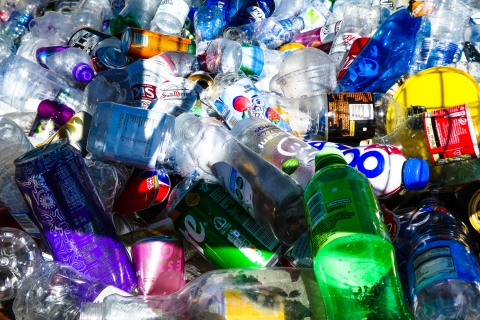

As the world prepares for the second round of negotiations for a Global Plastics Treaty, the Global Plastics Policy Centre has published a report which unpacks National Action Plans
25 May 2023
As the world prepares for the second round of negotiations (INC-2) for a Global Plastics Treaty in Paris next week (28 May-2 June), the Global Plastics Policy Centre at the University of Portsmouth has published a report which unpacks a debated topic from the first round of negotiations last November – National Action Plans (NAPs).
The policy brief report – ‘Effectiveness of National Action Plans’ - is based on evidence from peer-reviewed scientific articles, reports from INC-1, expert interviews, and stakeholder and member state submissions to the INC Secretariat. It aims to determine the effectiveness of current NAPs and help support the decision-making process around their implementation for the Global Plastics Treaty.
The current implementation style of national action plans has resulted in limited evidence and therefore, limited knowledge of their effectiveness
Laura Nieminen, Project Coordinator at the Global Plastics Policy Centre
National Action Plans are a hotly debated subject. Their success relies on each country voluntarily submitting plans for action, yet there are no measures in place to ensure they are implemented. It is an approach used in the Paris Climate Agreement.
Laura Nieminen, Project Coordinator at the Global Plastics Policy Centre, at the University of Portsmouth said: “While National Action Plans often act as catalysts for action on issues, such as plastic pollution and paving the way for future interventions by national governments, the current implementation style of national action plans has resulted in limited evidence and therefore, limited knowledge of their effectiveness.”
The Global Plastics Policy team identified several limitations of NAPs:
- Uncoordinated efforts, and inconsistent definitions and metrics
- Mandates requiring the production of national action plans but which do not specify their content
- Unmonitored implementation and a lack of accountability resulting in uncertain effectiveness
- Lack of transparency, funding, and legislative support for national action plan objectives
There is little evidence on whether National Action Plans can simultaneously curb plastics pollution within different member states as well as effectively reduce plastics pollution globally. More consideration needs to be given to their implementation.
Antaya March, Lead Researcher at the Global Plastics Policy Centre
Antaya March, Lead Researcher at the Global Plastics Policy Centre at the University of Portsmouth said: “Around 85 percent of member states supported National Action Plans in their submissions to the INC-2, making their adoption as a treaty measure likely. However, there is little evidence on whether National Action Plans can simultaneously curb plastics pollution within different member states as well as effectively reduce plastics pollution globally. More consideration needs to be given to their implementation.”
For NAPs to be implemented successfully as part of the Global Plastics Treaty the team
recommends they should:
- Be legally binding, supported by national legal and institutional frameworks.
- Have stringent compliance measures to ensure national commitments are met.
- Have robust monitoring, evaluation, reporting, and sharing of data.
- Be revised frequently to incorporate new knowledge and adapt to policy successes or failures.
- Be supported by technical and financial assistance to ensure successful implementation and compliance.
- Include national targets and implementation measures aligned to the global treaty.
This policy brief is the first of many to be produced by the team at the Global Plastics Policy Centre. Focusing on select “hot topics” from the treaty negotiations, the policy briefs will bring together key evidence from various data sources to shed light on each topic and aid the countries in their decision-making journey.
To access the Global Plastics Policy Centre’s new resource - please visit https://plasticspolicy.port.ac.uk/research/national-action-plans/
